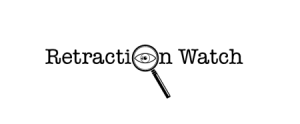 The week at Retraction Watch featured an inscrutable retraction notice, and a raft of new retractions for a cancer researcher who once threatened to sue us. Here’s what was happening elsewhere: Continue reading Weekend reads: Manuscript submission headaches; Trophy Generation goes to grad school; is science fucked?
The week at Retraction Watch featured an inscrutable retraction notice, and a raft of new retractions for a cancer researcher who once threatened to sue us. Here’s what was happening elsewhere: Continue reading Weekend reads: Manuscript submission headaches; Trophy Generation goes to grad school; is science fucked?
Author: Ivan Oransky
Weekend reads: “Research parasite” doubling down; racism in the lab; clinical trial insider trading
 The week at Retraction Watch saw news of a settled lawsuit, and had us celebrating our sixth anniversary with the announcement of a new partnership. Here’s what was happening elsewhere: Continue reading Weekend reads: “Research parasite” doubling down; racism in the lab; clinical trial insider trading
The week at Retraction Watch saw news of a settled lawsuit, and had us celebrating our sixth anniversary with the announcement of a new partnership. Here’s what was happening elsewhere: Continue reading Weekend reads: “Research parasite” doubling down; racism in the lab; clinical trial insider trading
Happy sixth anniversary, Retraction Watch! Here’s to a new partnership with Science
 August 3rd has rolled around again, which means it’s time to celebrate another Retraction Watch anniversary — this time, our sixth.
August 3rd has rolled around again, which means it’s time to celebrate another Retraction Watch anniversary — this time, our sixth.
It’s been an exciting year. Some highlights: Continue reading Happy sixth anniversary, Retraction Watch! Here’s to a new partnership with Science
Scientist with three retractions settles lawsuit against George Washington University

A researcher whose work has been subject to three retractions and two expressions of concern has settled a lawsuit he filed against his university for breach of contract and emotional distress.
Rakesh Kumar had sued George Washington University for $8 million, claiming that his employer had relieved him of department chair duties without following the correct procedure, following a finding of misconduct in his lab. He also claimed that the university had either leaked confidential information about an investigation into his work, or at least failed to keep that information from being posted in a comment here on Retraction Watch.
Last year, the university filed a motion to dismiss the case, but in March, a judge allowed some of it to go forward. On Thursday, the parties settled the case.
We asked Kumar’s attorney, Paul Thaler, to describe the terms of the settlement and say whether Kumar would remain employed at George Washington: Continue reading Scientist with three retractions settles lawsuit against George Washington University
Weekend reads: What lurks in clinical trial databases; plagiarism by Russian ministers; why journals shy away from fraud allegations
 The week at Retraction Watch featured a PhD student expelled for submitting a paper without her co-authors’ permission, and a look at the six types of peer reviewers. Here’s what was happening elsewhere: Continue reading Weekend reads: What lurks in clinical trial databases; plagiarism by Russian ministers; why journals shy away from fraud allegations
The week at Retraction Watch featured a PhD student expelled for submitting a paper without her co-authors’ permission, and a look at the six types of peer reviewers. Here’s what was happening elsewhere: Continue reading Weekend reads: What lurks in clinical trial databases; plagiarism by Russian ministers; why journals shy away from fraud allegations
Weekend reads: Lying academics; journals to blame for bad behavior; why bad science is funded
 The week at Retraction Watch featured a first in transparency from Canada, and the second retraction for a fan of a conspiracy theory. Here’s what was happening elsewhere: Continue reading Weekend reads: Lying academics; journals to blame for bad behavior; why bad science is funded
The week at Retraction Watch featured a first in transparency from Canada, and the second retraction for a fan of a conspiracy theory. Here’s what was happening elsewhere: Continue reading Weekend reads: Lying academics; journals to blame for bad behavior; why bad science is funded
How to better flag retractions? Here’s what PubMed is trying

If you’ve searched recently for retracted articles in PubMed — the U.S. National Library of Medicine’s database of scientific abstracts — you may have noticed something new.
In fact, you may have had trouble ignoring it, which is sort of the point. “It” is a large salmon banner that looks something like this: Continue reading How to better flag retractions? Here’s what PubMed is trying
Canada funding agency bans researcher for fraud, and in first, reveals her name

The Canadian Institutes of Health Research (CIHR) has banned a bone researcher for life following a finding of misconduct. And in a first, the agency has named her, in their report out today.
The case of Sophie Jamal may be familiar to Retraction Watch readers, as we covered it in October of last year following reporting by The Toronto Star. JAMA retracted a 2011 study by Jamal and colleagues in December, as we reported, and she resigned her positions at Women’s College Hospital (WCH) and the University of Toronto.
Jamal, according to the an investigating committee at WCH: Continue reading Canada funding agency bans researcher for fraud, and in first, reveals her name
Weekend reads: More Impact Factor scrutiny; $10 million fine for overbilling; protected Canadian fraudsters
 The week at Retraction Watch featured the loss of a Harvard researcher’s PhD for misconduct, and the harrowing tale of a whistleblower. Here’s what was happening elsewhere: Continue reading Weekend reads: More Impact Factor scrutiny; $10 million fine for overbilling; protected Canadian fraudsters
The week at Retraction Watch featured the loss of a Harvard researcher’s PhD for misconduct, and the harrowing tale of a whistleblower. Here’s what was happening elsewhere: Continue reading Weekend reads: More Impact Factor scrutiny; $10 million fine for overbilling; protected Canadian fraudsters
Vast majority of Americans want to criminalize data fraud, says new study
 As Retraction Watch readers know, criminal sanctions for research fraud are extremely rare. There have been just a handful of cases — Dong-Pyou Han, Eric Poehlman, and Scott Reuben, to name several — that have led to prison sentences.
As Retraction Watch readers know, criminal sanctions for research fraud are extremely rare. There have been just a handful of cases — Dong-Pyou Han, Eric Poehlman, and Scott Reuben, to name several — that have led to prison sentences.
According to a new study, however, the rarity of such cases is out of sync with with the wishes of the U.S. population:
Continue reading Vast majority of Americans want to criminalize data fraud, says new study